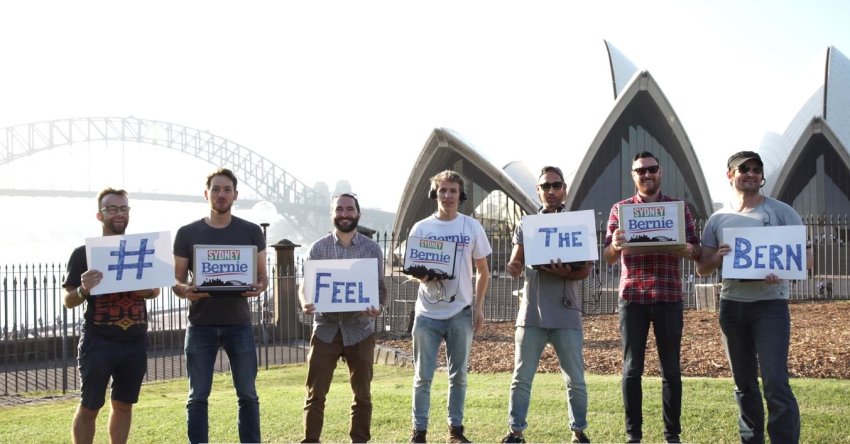
“Bernie! Bernie! Bernie!” the lady from California enthusiastically chanted down the phone. Some 12,000 kilometres away on a couch in Sydney, I started to chant too. It was infectious.
Mathis, in the middle of his own phone call, grinned from across the room. So did Marcus and Alannah. I would soon learn this sort of thing happened quite a bit when calling US voters on behalf of Bernie Sanders.
The US general election is in November and right now we are at the pointy end of the primaries, where Democrats and Republican candidates compete in elections held across the US until the parties officially endorse their nominee in July.
Despite the fears and objections of the entire Republican establishment, Donald Trump is now their only remaining candidate.
Meanwhile, on the Democrat side, neither Sanders, the self-described democratic socialist, nor Hillary Clinton have won enough delegates to secure their party's nomination. That means they will go to a contested Democratic Convention in June, where the party will decide who they will put forward as their presidential nominee in November.
Even though Sanders has been an outspoken Senator, fighting for equality for 30 years, the first time I heard his name was just nine months ago when he announced he was running for president.
How had I not heard of Bernard “Bernie” Sanders before? Here was this fearless Larry David lookalike, censuring Republicans and Democrats alike on a daily basis for ignoring their constituents in favour of their big political donors.
Over his 30-plus years in politics, Bernie's has been one of the loudest voices in the fight for LGBTI rights, racial justice, women's rights, income equality and strong action on climate change.
Notably, he is one of the very few in US political history to have stood up against the influence of big money in politics. But up until now, his voice has been largely unheard.
supporting-bernie-sanders-harbour-bridge-sydney.jpg

I was determined to get behind Bernie somehow, so a couple months ago I tracked down a group of dedicated Bernie fans called Australians Supporting Bernie Sanders. They have been meeting regularly since the start of the year to phone US voters on behalf of Sanders — also known as phonebanking. After contacting the group via Facebook, I found myself Skyping one of their organisers, Mathis Dührsen.
“Bernie Sanders is the most important politician of our generation,” he began in his German-Australian accent. “The fact that a US Democratic Party candidate is being supported by mass public donations averaging just $27 each, rather than millions of corporate sponsors' money is already historic.
“My hope is that if and when Bernie becomes President of the United States of America, he will lead by example to reduce the role of money in politics worldwide.”
Over the course of two months, in the company of Mathis and a motley crew of fellow Bernie fans, I would experience many truly interesting — and some weird — conversations with US voters.
I was not alone: apparently Mathis has been told eight times now that he sounds like Arnold Schwarzenegger. Another volunteer, Marcus, called a woman in Oregon once who was excited to talk about Sanders but unfortunately could not vote because she had recently been convicted of murder.
The phonebanking part was easier than I expected because I was just reading a script. The most exciting part was talking to voters. Meeting a Bernie supporter on the end of the line is always exciting but, unexpectedly, I also got a lot out of speaking with Trump and Clinton supporters.
Speaking with the supporters of other candidates has given me a different insight on the world. However, the theme that runs through most of my conversations has been the frustration of voters with a government that has long forgotten them.
One of the most astounding things I have discovered is how many voters have no idea who Bernie is — literally. The mainstream media has actively ignored Sanders' entire primary campaign, so a good portion of voters either have no opinion of him, or think he is a radical candidate without a hope in hell of being elected.
Being able to educate these people about Bernie's vision for their country, and the world, has been the most rewarding part of the entire process. The fact is, the more people learn about Bernie the more they like him. The problem Bernie faces is a virtual media blackout.
For Bernie to be in a strong position going into the Democratic Convention, he needs to win in the remaining few states — notably California, with 546 delegates on offer, and New Jersey, with 126 delegates. Both go to the polls on June 7.
To date, Australians Supporting Bernie Sanders has made more than 14,000 calls to US voters, but to reach their goal of 30,000 calls they need to get more Australians involved.
[If you would like to volunteer, you can find the Australians Supporting Bernie Sanders group on Facebook. Send them a private message or contact Mathis directly.]